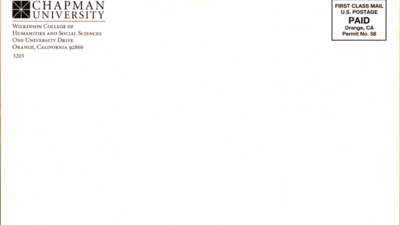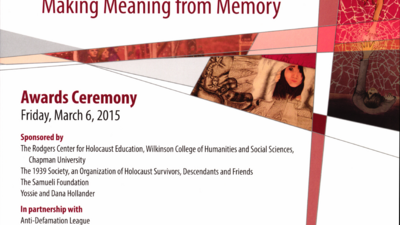Oral History Interview with Sylvia Schneider
Title
Date
Contributor
Summary
Sylvia Schneider, née Balbierer, was born in Cologne, Germany on May 4, 1928 to an Orthodox Jewish family. Her father, a language teacher was born in Belgium of Russian ancestry. Her mother was from Krakow, Poland. A happy childhood ended for Sylvia in 1935-36, when her sister Ruth was beaten by Hitler youth. Years later, while studying nursing in England, Ruth died in 1943 of a brain aneurysm presumably caused by that injury.
On October 28, 1938, the Gestapo deported Sylvia, Ruth and their mother, along with many others with Polish passports to Zbaszyn. She described freezing living conditions in 1938-39 in the no man's land between the German and Polish borders. In May 1939 her family joined an aunt in Krakow and then went to Otwock, near Warsaw for the girls to await a Kindertransport ship to England. They were parted from their mother and experienced unhappy stays in private homes and a children's hostel, but Sylvia names several caring women who befriended her. In 1947, she immigrated to the United States, where she married and had a daughter. She gave up her Orthodox religious faith when she learned that her mother was gassed at Auschwitz and her father died in another camp, but she continued to identify herself as a traditional Jew.
none
More Sources Like This
of
Nino deProphetis
Dr. Nino deProphetis served with the U.S. Army in Europe from November, 1944 to December, 1945. He became the commanding officer of the 81st Armored Medical Battalion, part of the 11th Armored Division of General Patton’s Third Army. In April1945, he led a contingent of 30 men to Mauthausen concentration camp after the Nazis had left. He describes in detail his entry and the sight of a pyramid of approximately 6000 naked bodies in the main yard. He viewed an additional number of thousands of bodies in smaller piles in other parts of the camp and also saw two gas chambers. His unit, equipped to treat only battle casualties, was quickly reinforced with troops that brought an abundance of food. He believes that many of the subsequent deaths of surviving prisoners were caused by overfeeding. He describes in detail the terrible malnutrition and gastrointestinal disease of most prisoners, as well as the immediate disposal of dead bodies into a trench. Soon afterwards, General Patton ordered that local citizens were made to exhume the bodies and rebury them in individual graves.
Dr. deProphetis also supervised the evacuation of patients for the next two weeks until he was transferred to the Gmunden area, near Salzburg. There, he was placed in charge, as Burgermeister of Attensee. He remained with the Army of Occupation for six months, in charge of all battalion vehicles until his return to the United States.
This file includes photos taken at the time of liberation.
of
Caroline Gutman
Caroline Gutman, nee Gersten, was born in Semipalatisnk, Siberia on November 9, 1944. Her family fled there when the Germans entered their town of Melitz, Poland in 1940. Her father was a shoemaker and tailor. After the war they smuggled out of Siberia to Germany. She and her family lived in a displaced persons camp in Berlin, Germany and later in another camp, Feldafing, near Munich. She came to the United States when she was 8 years old, on January 11, 1952.
The interview focuses on Caroline’s emotional responses to her childhood experiences. Caroline describes her feelings as a child survivor and daughter of two survivors (having lost much of her extended family) growing up in America.

This document is a program for an event titled 'A Conversation with Elie Wiesel' held at Chapman University on April 9, 2014. The program welcomes Orange High School and includes a detailed biography of Nobel Laureate Elie Wiesel, highlighting his experiences during the Holocaust, his literary work (especially 'Night'), and his extensive activism for peace and human rights globally. It mentions his numerous awards and his involvement with The Elie Wiesel Foundation for Humanity and Boston University. The program lists participants in the event, including Professor Jan Osborn, Principal Ernie Gonzalez, and President James L. Doti, and features several quotes attributed to Elie Wiesel. The document serves as an informational booklet for attendees of the event.
of
Liesl Loeb
Liesl Joseph Loeb was born on June 17, 1928 in Rheydt, Rhineland, Germany. Liesl, together with her father, Josef Joseph, an attorney, and her mother, Lilly Salmon Joseph, was a passenger on the S.S. St. Louis. This German luxury Liner sailed on May 13, 1939, from Hamburg toward Havana, Cuba, with 937 Jewish refugees on board.
Liesl speaks about her family background and life leading up to Kristallnacht which she experienced, hiding in her own home while Nazi hoodlums were vandalizing it. She describes the months leading up to embarkation and conditions which had to be met before leaving Germany and immigration into Cuba, which was to be temporary until the family’s quota number was called for the United States.
She describes the trip and its complications from a child’s perspective. She speaks of her father’s sense of duty as the chairman of the passenger committee and the commitment and devotion of all its members. The desperate situation of the hapless passengers to whom no country offered a haven, especially not the United States, is emphasized. After 40 days at sea, the passengers are rescued through the efforts of the American Jewish Joint Distribution Committee (JDC), by four countries - England, Holland, France, and Belgium.
Finally the Joseph family lands in England, and their life as World War II began is described. The destiny of most of the passengers who were taken in by Holland, France and Belgium ended in tragedy when these countries were invaded by the Nazis.
She describes attending school as an “evacuee”, the internment of her father on the Isle of Man as an enemy alien and arrival in New York on September 10, 1940. She concludes with her graduation from high school, and her immediate marriage thereafter. Several footnotes pursuant to the St. Louis story are added at the end of this memoir.
Self-taped oral memoir: LOEB, Liesl Joseph Date: Nov. 17, 1998

This document is a program for the 16th Annual Holocaust Art & Writing Contest, an event presented by Chapman University and The 1939 Society, with its awards ceremony held on March 6, 2015. The program details the contest's theme, "From Discovery to Action: Making Meaning from Memory," and acknowledges various sponsors, partners, and individuals involved as speakers and judges. It also includes information on a related "Evening of Holocaust Remembrance" held on April 16, 2015, which commemorated the 70th Anniversary of Liberation. A significant portion of the program features student artwork and a detailed biography of Holocaust survivor Jack Pariser, highlighting his remarkable story of survival during the Holocaust. Additionally, the program lists the numerous middle and high schools from across the United States and one from China that participated in the contest. The document serves as a comprehensive record of the event, its participants, and its educational mission.
of
Liberator Anonymous
Individual was a Captain in the Counter Intelligence Corps (CIC) of the United States Army during World War II. He entered Dachau Concentration Camp in April 1945, a few days after liberation, to interrogate Nazis who stayed behind because they wanted to be questioned by Americans not Russians. He was taken on a tour of Dachau and describes what he saw and heard, including accounts of atrocities inflicted on the prisoners, and what he learned during the interrogation, in gruesome detail. He mentions how the experience of seeing Dachau affected him and the other men in his unit.
He reported to his commanding officer in Munich. He was assigned to a Displaced Persons camp at Coburg, Germany. He describes poor conditions at the camp, nightly searches, the treatment of survivors, and briefly mentions a riot at the camp in 1946. He explains why he feels that the displaced persons could have been treated more humanely and how these experiences affect him still.